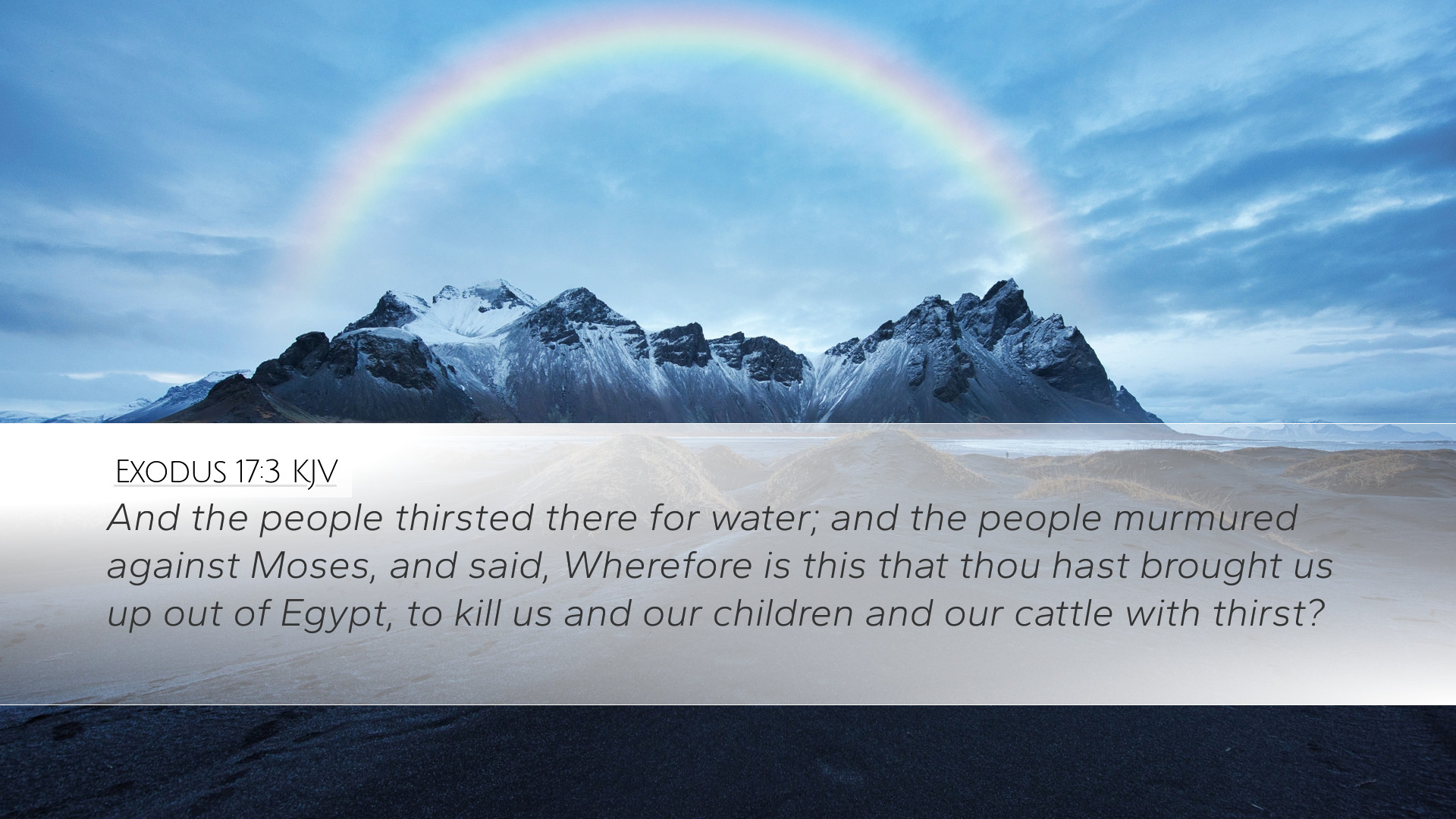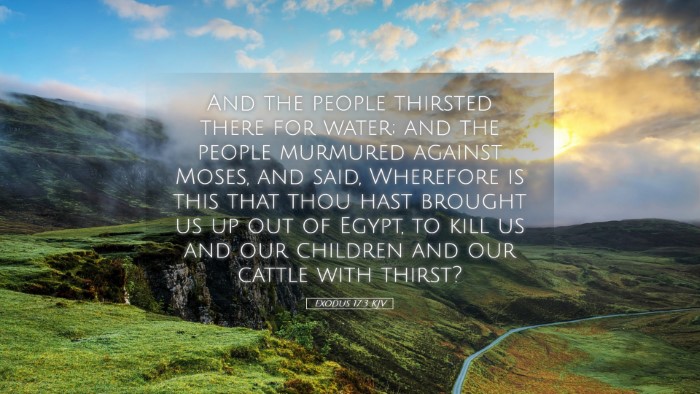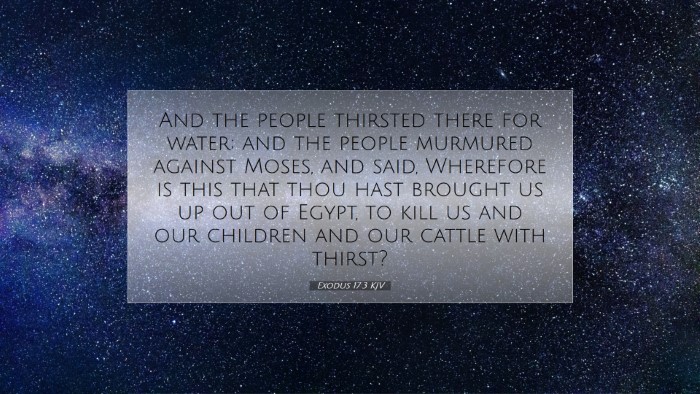Exodus 17:3 - Commentary and Insights
Exodus 17:3 states, "But the people were thirsty for water there, and they grumbled against Moses. They said, 'Why did you bring us up out of Egypt to make us and our children and livestock die of thirst?' This verse encapsulates a critical moment in the journey of the Israelites through the wilderness, presenting themes of dissatisfaction, complaint, and the importance of trust in divine provision.
Contextual Background
The Israelites, having been delivered from Egyptian bondage, are now in the wilderness, a place characterized by trials and tests. Their journey is not merely a physical relocation but a spiritual pilgrimage, intended to bring them closer to reliance on God. This passage occurs shortly after the miraculous splitting of the Red Sea and the provision of manna, emphasizing the continued struggle with faith amidst miraculous deliverances.
Insights from Public Domain Commentaries
Matthew Henry's Commentary
Matthew Henry emphasizes the credibility of the Israelites' complaints, pointing out their instinctive response to immediate needs over remembering past provisions. He notes:
- The Tendency to Grumble: Henry highlights that the thirst experienced was not merely physical but a spiritual trial, where the lack of water exposed their doubts and fears.
- The Role of Leadership: The Israelites' grumbling against Moses reflects on the nature of leadership during crises. Henry suggests that leaders often bear the weight of the people's complaints, yet must remain steadfast in faith amidst their trials.
- Testing of Faith: This moment serves as a test of faith; Henry urges readers to view these trials as opportunities for spiritual growth and deeper trust in God.
Albert Barnes' Notes on the Bible
Albert Barnes examines the historical and geographical context of the verse, pointing out that these experiences occur in the desert of Sin. He reflects on:
- The Human Condition: Barnes notes the innate human tendency to forget past mercies when in the midst of present trials, indicating a failure to recognize God's continuous support and intervention.
- The Nature of Complaints: The Israelites question the purpose of their exodus, pointing to a deeper spiritual malaise. Barnes suggests that their complaints reveal a misunderstanding of their journey and God’s plan for them.
- The Divine Response: Barnes anticipates God's provision, suggesting that despite their grumbling, God’s grace and mercy will abound as He responds to their needs more abundantly than they can imagine.
Adam Clarke's Commentary
Adam Clarke provides a detailed linguistic and cultural analysis of the verse, shedding light on the implications of thirst and longing in ancient Israelite culture:
- The Symbolism of Water: Clarke illustrates that water often symbolizes life and sustenance in Scripture, stressing the severity of their plight and the urgency of their cries.
- Cultural Responses to Thirst: He contextualizes their cries within ancient Near Eastern society, where lack of water could lead to despair and hopelessness, highlighting the deeper spiritual implications of their complaint.
- God's Faithfulness: Clarke emphasizes that God would provide for their needs, affirming His covenant promises to care for His people even in the wilderness.
Theological Implications
This passage raises profound theological questions about faith, human frailty, and divine provision. It underscores the tension between the spiritual and physical needs of believers. The Israelites, despite witnessing God's previous miracles, quickly fall into despair, illustrating a common human response to immediate crises. Below are key theological points drawn from the commentaries:
- Faith in the Wilderness: The wilderness becomes a metaphor for spiritual testing. Believers are often subjected to trials that tempt them to doubt God's provision, pointing to the necessity of steadfast faith.
- Divine Provision: God's response to the Israelites not only provides for their physical thirst but also seeks to deepen their faith, pointing towards larger themes of redemption and hope.
- The Leader’s Burden: Moses represents the faithful servant who bears the complaints of his people, an archetype reflecting Christ's ultimate bearing of human burdens and intercession.
Applications for Modern Believers
This narrative has profound implications for pastors, students, and theologians engaged in ministry today:
- Guidance in Leadership: Understanding the weight of leadership and the importance of remaining grounded in faith during communal crises can help contemporary leaders navigate their congregations' struggles.
- Enduring Faith: Believers are encouraged to champion enduring faith amidst trials while reminding themselves of God's past faithfulness, fostering a culture of remembrance within congregations.
- Community Response: The collective nature of the Israelites’ complaint serves as a lesson on the importance of faith community, urging believers to support one another through trials rather than succumb to despair.
Conclusion
Exodus 17:3 serves as a poignant reminder of the very human struggle between faith and doubt, especially in times of need. The insights from Matthew Henry, Albert Barnes, and Adam Clarke foster a deeper understanding of the text's richness and offer practical applications for believers today. As we reflect on this verse, may we be equipped to trust God’s provision even in our most desperate moments, remembering that He is always with us in our journey through the wilderness of life.


